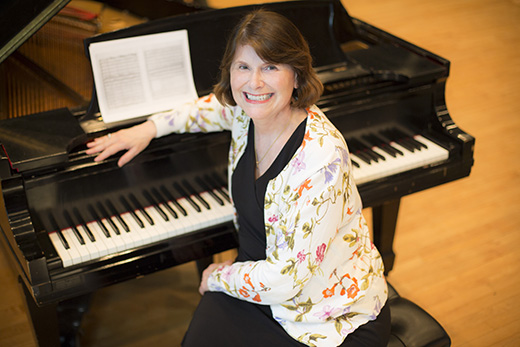Emory College history professor Judith Miller was reading a number of plays and other works from the late 18th century as she worked on her new book about the “political self” of the French Revolution.
The violence of the stage and musical works of the time, she says, both reflected and shaped the chaos of the Revolution.
Miller had been working through the complicated score for one piece in particular, Constance Pipelet's libretto for a tragedy based on the Greek poet Sappho’s life, when the call came.
Opera Lafayette Conductor Ryan Brown had heard of Miller’s work and wondered: Would she be interested in helping his company with its modern premiere of the Pipelet piece that hadn’t been performed since 1796?
“Of course! The score was next to me on the piano,” Miller says, referring to the baby grand rebuilt by her father.
“I can imagine the audience sitting there then, hearing about the loss of her love and reflecting on what they lost in the Terror,” she adds. “These were losses that could not be repaired.”
'Art and life came together'
Opera Lafayette, which presents the Pipelet series in Washington, D.C., and New York City this spring, specializes in the French repertoire of opera, as well as precursors to that work and its legacy. Its upcoming production, "Opera and the French Revolution,” could very well describe Miller’s professional and personal passions.
She is a lifelong classical music fan, who had opera tickets for the tours of the Metropolitan Opera Company as a teen growing up in Cleveland and, to this day, schedules her Saturdays based on what that company is slated to perform.
Miller is also an expert on French history. Her book-in-progress examines how politicians and lawmakers dealt with the psychological volatility that some believed contributed to the violence and political instability of the French Revolution. In its aftermath, they worried about how to steady a society that had been led astray so easily.
Miller is especially interested in the intersection of dramatic works of the era, which show characters suffering the psychological damage and trauma that had begun to pervade French society.
One chapter will discuss Pipelet, who was herself an interesting character as well as an ambitious female author.
The daughter of a minor noble family, Pipelet was in hiding when she crafted the melancholy version of Sappho as unstable and eventually suicidal. That the death was shown on stage was groundbreaking for the time, Miller says, because the French norms prohibited such violence.
Brown, the artistic director for the opera, said he was thrilled to work with Miller to capture the emotion of the scene — and of that era.
Miller, for instance, pointed out the implications in Sappho’s last words, “Forgive him, he was led astray,” using the French word "égarer," which could also mean seduced.
If the villains had been led astray, on stage and in the violence in the streets, they were not directly responsible and could be forgiven, Miller explained to the composer.
“Her explanation brings to the fore how much art and life came together in that moment,” Brown says. “As the government is trying to come to grips with who was guilty or not, who should be punished or not, the theater is doing the same.”
Sharing history with theater audiences
Miller has already shared such insights online and during a seminar on the upcoming production at Columbia University’s Maison Française.
Her research into the era also allows her to comment on the other pieces in the production, which in addition to Pipelet's and Martini's 1794 "Sapho" [sic]features excerpts from the Sacchini/Guillard "Oedipe à Colonne" (1786) and the Cherubini/Hoffmann "Médée" (1797).
She will lead pre-performance discussions for the modern premiere, set for April 29 in the Lisner Auditorium at George Washington University in Washington. She will also conduct a pre-performance discussion on May 1 in the Noble Room of the Lincoln Center in New York City.
Miller also remains hard at work on her book. She is hopeful about contributing to the kinds of connections that have formed between Emory and arts institutions.
“I think that there is a real thirst out there for serious discussions, about works of art, about literature, about history,” Miller says. “Why wouldn’t we want to think about the human condition and have exposure to all the different things that help us understand it?”
Emory alumni and friends are invited to attend the Washington premiere of "Opera and the French Revolution,” as well as the New York City production.
A 50 percent discount will be available for Emory affiliated audience members for the D.C. performances. Through April 25, use the code EMORY50 at theLisner box officesite.
Otherwise, see information about tickets and show times.

